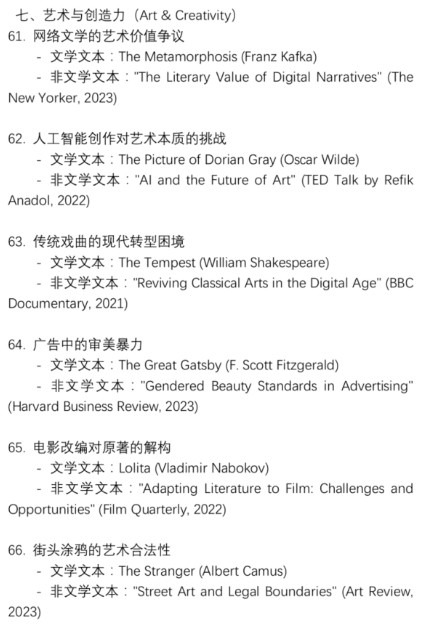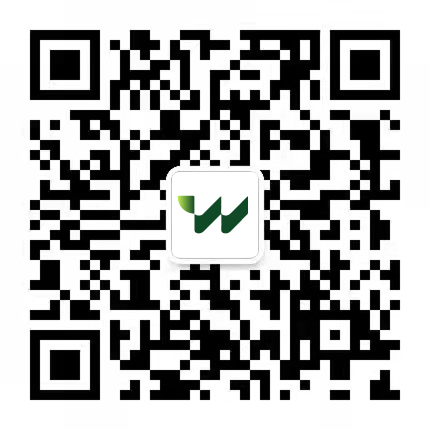

很多同学都觉得io的定题很难缺乏灵感,今天惟世国际教育为大家给大家整理了超多个选课,ib英文io选题没想法?这篇别错过!赶快来看看吧~
一、身份认同
1.移民二代的身份撕裂
文学文本:The Joy Luck Club (Amy Tan)
非文学文本:"The Identity Crisis of Second-Generation Immigrants" (The New York Times, 2022)
2.性别角色的社会期待
文学文本:Pride and Prejudice (Jane Austen)
非文学文本:
“Breaking Gender Stereotypes in Modem Society"(TED Talk by Michael Kimmel,2020)
3.网络虚拟身份的真实性
文学文本:Norwegian Wood (Haruki Murakami)
非文学文本:
Digital Identities: The Dual Lives of Gen Z(BBC Documentary,2021)
4.青年亚文化群体的身份标签
文学文本:The Catcher in the Rye (J.D.Salinger)
非文学文本:
Subcultures and Identity in the Digital Age(ournal of Youth Studies,2023)
5.跨国婚姻中的身份认同矛盾
文学文本:Memoirs of a Geisha (Arthur Golden)
非文学文本:
Cultural Adaptation in Cross-Border Marriages"(The Guardian,2021)
6.社交媒体对青少年身份焦虑的影响
文学文本:Brave New World (Aldous Huxley)
非文学文本:'Social Media and Teen Identity Formation'(Psychology Today.2022)
7.单亲家庭子女的身份归属困境
文学文本:The Great Gatsby (F. Scott Fitzgerald)
非文学文本:
Single-Parent Families and Child Development (Child Development Joumal,2021)
8.残障人士的社会身份重构
文学文本:The Metamorphosis (Franz Kafka)
非文学文本:
Workplace Challlenges for People withDisabilities"(WHO Recort,2023)
9.数字时代下的“网红经济”身份建构
文学文本:Fahrenheit 451 (Ray Bradbury)
非文学文本:
The Rise and Risks of Influencer Culture’ (The Economist, 2023)
10.代际价值观差异下的身份认同危机
文学文本:A Doll’s House (Henrik lbsen)
非文学文本:
“Intergenerational Values and Identity Conflicts"(Harvard Business Review, 2022)
文化冲突与融合(Cultural Clash & Integration)
1.全球化对传统文化的侵蚀
文学文本:Things Fall Apart (Chinua Achebe)
非文学文本:
Globalization and the Erasion of IndigenousCultures" (UNESCO Report.2023)
2.代际文化差异的家庭冲突
文学文本:A Doll’s House (Henrik itsen)
非文学文本:
Intergenerational Cultural Conflicts in ModernFamilies (Paychology Today,2022)
3.东西方教育理念的碰撞
文学文本:Three Cups of Tea (Greg Mortenson)
非文学文本:
Comparing Eastern and Western Educational Philosophies"(Harvard Education Review,2021)
4.语言商业化对文化纯正性的冲击
文学文本:1984 (George Orwell)
非文学文本:
The Commodification of Language in the DigitalEra(The Atlantic, 2023)
5.移民文化的本土化改造
文学文本:The God of Small Things (Arundhati Roy)
非文学文本:'The Evolution of Chinalowns in the Globalized World" (National Geographic,2022)
6.传统节日的商业化与仪式感消退
文学文本:The Call of the Wild (lack London)
非文学文本:
Commercialization of Christmas: AGlobalTrend (The Economist,2023)
7.亚文化圈层的封闭性
文学文本:Harry Potter and the Sorcerer’s Stone (J.K.
Rowling)
非文学文本:“Closed Subcultures in the Digital Age"(Journal
of Youth Studies, 2023)
8.城市化进程中的乡村文化消亡
文学文本:The Grapes of Wrath (John Steinbeck)
非文学文本:"Urbanization and the Disappearance of Rural
Cultures" (Science Advances,2022)
9.影视作品中的文化挪用争议
文学文本:The Bluest Eye (Toni Morrison)
非文学文本:
Cultural Appropriation in Media: Boundariesand Ethics"(The New York Times,2023)
10.网络梗文化的跨文化传播
文学文本:The Catcher in theRye(J.D.Salinger)
非文学文本:
Internet Memesand Cross-Cultural Communication" (Journal of Digital Communication,2023)
二、科技与社会
1.智能的伦理边界
文学文本:Frankenstein(Mary Shelley)
非文学文本:
Boundaries of Artificial Intelligence~(MITTechnology Review,2023)
2.社交媒体对人际关系的异化
文学文本:Brave New World (Aldous Hudey)
非文学文本:
How Social Media Alters Human Relationships(The Social Dilemma, Netflix Documentary,2020)
3.网络隐私权的法律保护
文学文本:1984(George Orwell)
-非文学文本:The GDPR and the Future of Privacy"(European
Commission Report,2022)
4.科技依赖对人类认知的侵蚀
文学文本:The Three-Body Problem (Liu Cixin)
非文学文本:"Smartphone Addiction and Cognitive Decline"(Nature Neuroscience,2023)
5.基因编辑的道德争议
文学文本:Gattaca (Film)
非文学文本:“CRISPR Technology and the Ethics of Gene
6.虚拟现实对现实认知的冲击
文学文本:The Matrix (Film)
非文学文本:VR and the Redefinition of Reality" (Science Advances.2022)
7.网络信息过载与批判性思维
文学文本:Fahrenheit 451 (Ray Bradbury)
-非文学文本:"Post-Truth Era and Fake News" (BBC Nens,2023)
8.自动驾驶的责任归属
文学文本:LRobet (saac Asimov)
-非文学文本:"Autonomous Vehicles and Legal Liability"
(Fortes,2023)
9.数字货币的金融风险
文学文本:The Great Gatsby (F. Scott Fitzgerald)
非文学文本:
Bitcoin Regulation and Financial Risks"(FinancialTimes,2023)
10.科技垄断对市场公平的冲击
文学文本:The Circle (Dave Eggers)
非文学文本:
Tech Monopolies and Market Inequality"
(Harvard Business Review.202

io确定选题后该如何准备?
要在IB(国际文凭)英语语言与文学的口语评估(IO,Individual Oral)中拿高分,一定要做好以下几方面。
深入理解评分标准:
熟悉IB的评分标准是取得成功的关键。包括知识与理解、分析与评价、焦点与组织以及语言的使用。
做好万全的准备:
在正式口语评估之前,彻底研究你的文本和相关的全球问题。准备详细的笔记和概要,并对可能讨论的要点和论据进行归档。
口语调理要清楚:
口语评估应该有一个清晰的开头、中间和结尾。开头简要介绍文本和全球问题;中间部分深入分析文本如何通过其内容、形式和风格来探讨这些问题;结尾总结你的分析。
深入分析话题:
不能只是简单地描述文本。深入探讨语言、符号、文化背景和文本结构如何构建意义,并与全球问题相联系。
练习口语技巧:
练习清晰、流畅地说话,并保持适当的语速。使用恰当的语调和停顿来强化你的论点。考虑练习前的口语练习,以提高信心和熟练度。
时时关注时间:
练习控制你的口语时间,以确保你能够在规定时间内覆盖所有重要点。使用计时器进行练习,并适当调整你的内容以适应时间限制。
反馈与改进:
在准备过程中,向老师、同学或其他熟悉IB评估标准的人寻求反馈。根据反馈进行调整和改进。
凡来源标注“惟世国际教育”均为惟世国际教育原创文章,版权均属惟世国际教育所有,任何媒体、网站或个人未经本网协议授权不得转载链接、转贴或以其他任何方式复制、发表。未注明来源等稿件均为转载稿,如涉及版权请联系在线客服处理。

可添加微信【KesWish】(备注官网)申请试听,享专属套餐优惠~
加微信【KesWish】享优惠套餐
免费获得学习规划方案
已有 2563 位留学生获得学习规划方案



马上领取规划
*已对您的信息加密,保障信息安全。

咨询电话
客服电话: 132-6331-8174
免费电话咨询服务,放心接听!

在线咨询

微信客服

客服微信:KesWish

回到顶部